

Where are we now? SUMMER Review! Part 1? Futurelearn. 0:12Skip to 0 minutes and 12 secondsLanguage defines what we are.
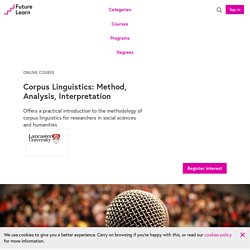
Something linguists argue it's the very essence of being human. It's the key skill that sets us apart from animals. Yet while we use language routinely, on a daily basis, it's something which we don't fully consciously comprehend. It's difficult to understand consciously the mechanics of language. Until recently, the sheer scale of language defied a comprehensive analysis, but that wasn't for want of evidence. 1:06Skip to 1 minute and 6 secondsThe computer has changed everything. 2:02Skip to 2 minutes and 2 seconds By entering the digital age, analysts are able to search for patterns that would probably defy analysis by hand and eye alone. 2:53Skip to 2 minutes and 53 seconds On this course, you'll learn about the range of applications of corpus data in the study of language both in linguistics and beyond it, in the social sciences for example.
7 Qestions with pleanary speakers: Alan Maley. 1) Looking back, what were the most important stepping stones in your life?
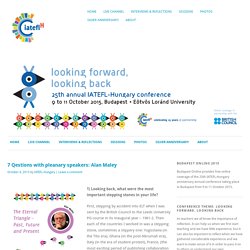
First, stepping by accident into ELT when I was sent by the British Council to the Leeds University PG course in its inaugural year – 1961-2. Then each of the countries I worked in was a stepping stone, sometimes a slippery one: Yugoslavia (in the Tito era), Ghana (in the post-Nkrumah era), Italy (in the era of student protest), France, (the most exciting period of publishing collaboration with Alan Duff), China (in the post cultural Revolution era – my greatest challenge), India (the most complex society I have ever been in). Then the major decision to resign from the British Council after 26 years and migrate to the Bell Educational Trust, Cambridge. Then the move to the National University of Singapore, and on to Bangkok, Kuala Lumpur and Ho Chi Minh City – my SE Asia period. After that, I ran out of stones to step on. ELT and Evernote: A match made in heaven. It’s always good to see a teacher blogging about tech they’ve found innovative uses for to help their teaching.

We came across this gem on Facebook. This post is a shortened version of the original which appeared on Lana’s blog. A few tips for mature entrants to the EFL profession (guest post) At IATEFL 2015 Manchester I was disappointed to miss a workshop by Helen Dennis-Smith with tips for more mature CELTA trainees on how to enter the profession once they’d finished their course.

I contacted her and she very kindly agreed to write this post for me. She’s now a teacher at Wimbledon School of English, London, UK. My experience. Prosvjetari: Neradnici, bejbisiteri i krivci za apsolutno sve što ne valja. Working smarter, not harder: tools for productivity. At ELTjam HQ, we talk a lot about working effectively, time management and productivity tools.
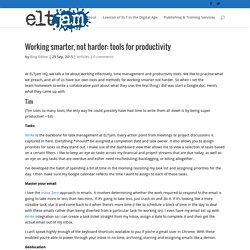
We like to practise what we preach, and all of us have our own tools and methods for working smarter not harder. So when I set the team homework to write a collaborative post about what they use, the first thing I did was start a Google doc. Here’s what they came up with. Tim. Answers about questions. (Split, Croatia) As a global speaker I like to say that a speaker should try to create a speech that works for everyone – a human speech – not have different speeches for different “cultures”, but that doesn’t mean that there are not differences in how audiences behave in different parts of the world.

Take questions for example. Today I spoke for a few hundred business people in Split, Croatia. The organisers had put in 10 minutes of Q&A at the end of my speech, but also told me before the speech: “If there are no questions we will ask you some questions.” and they also got some copies of my books to give away as “prices” to the people who would ask questions. Behind the scenes of a keynote speaker. Interview with Marjorie Rosenberg - The C Group.
How PowerPoint is killing critical thought. I still remember the best lecture I ever attended.
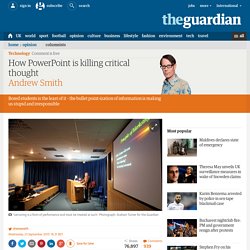
It was part of a joint series offered by the English and philosophy departments in my first term at university and, given that the subject was Sartre’s Being and Nothingness, should have been the dullest event in Christendom that night. A Quick Introduction to Podcasting for teachers & students. How to draw animals. Two Kinds Of People – A Getting To Know You Activity. As it’s the start of a new school year, I thought it was time to try out a new ‘getting to know you’ first lesson activity.
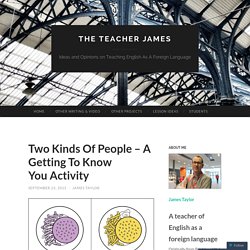
I came across the website 2 Kinds Of People which simply and beautifully portrays how easily the people can be separated into different groups. I thought it was a fun way to help the students learn something about each other, while giving them the chance to learn some very useful contemporary vocabulary and functional language. Here’s the activity plan… 1. Before class, print out (and laminate, if you can) the pairs of pictures. The Development of TESOL Methodology. ELT Planning. Test your knowledge: Second Language Acquisition. Helen Waldron English Language Coaching. Book review: “Presentation Lesson Hacks”, by Phil Wade. Why are so many people so terrified of giving presentations?
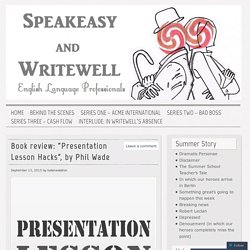
I’ll tell you why, it’s because presentations demand The Full Monty. Unlike a safe old written report they don’t just need good and clear content, they expect you deliver it yourself, stuck out there in front of rows of silent people, feeling you’re being judged on your voice, clothes, body language, age, race, and … well… soul. It’s your move… helping students manage spoken discourse.
Helping learners to deal with spoken discourse was a hot topic on my Diploma course.
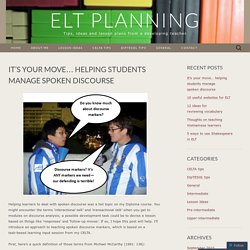
You might encounter the terms ‘interactional talk’ and ‘transactional talk’ when you get to modules on discourse analysis; a possible development task could be to devise a lesson based on things like ‘responses’ and ‘follow-up moves’. If so, I hope this post will help. I’ll introduce an approach to teaching spoken discourse markers, which is based on a task-based learning input session from my CELTA. First, here’s a quick definition of those terms from Michael McCarthy (1991: 136): Ceri Jones - This is just to say... This is one of my favourite ways in to using poetry in the classroom. I’ve found it works with all kinds of classes, from A2 up, with teenagers or adults.
Here is a ten step lesson plan for a whole lesson including eating, reading, writing and reciting. 1. Ask the students to eat a small piece of something tasty (fruit, chocolate, biscuits, cake …) and write down five words – or phrases – to describe the taste/texture experience. If you want to try it out, choose a piece of fruit from your kitchen, or if you’re not at home and have no fruit to hand, why not choose one from the fruit bowl in the image above? Heterodox Economics: A Blog Series. Markets are too important to leave to economists alone.
Economics structure human society so thoroughly and so profoundly that, just as it cannot be expected to remain the sole purview of mainstream economists, it cannot but benefit from an interdisciplinary approach. The tumult of boom-and-busts, the global reach of today’s markets, the inequitable distribution of the economy’s fruits, the increasingly dizzying financial maneuvers that speculate on and simultaneously manufacture our realities, have all coalesced—along with many other pertinent questions—into an increasing demand for a more pluralistic view of this enigma we call “the economy.” In response, a tide of academics is rising to offer fresh analyses of the questions raised by contemporary economic theory and its manifestations. 'SVAKU NOĆ SANJAM MAMU I TATU I PLAČEM' Dječak iz Sirije je potpuno sam došao od Damaska do Beograda. BFVC Refugee Humanitarian Aid by Philomena O'Brien. A-21st-century-migrants-checklist-water-shelter-smartphone.
'Myths and misconceptions about NNEST movement and research' - a webinar by Ali Fuad Selvi. How the job of a teacher compares around the world. There has long been a fascination with comparing the UK’s teaching system with what’s in place elsewhere in the world. Everyone from Ofsted chief Michael Wilshaw to the former education secretary Michael Gove have expressed admiration for Singapore’s education system, where young pupils achieve highly in maths. Research has now found that the education system in Finland offers the best value for money, with teachers achieving high Pisa scores, despite getting moderate salaries and teaching relatively large classes. The study of 30 OECD member nations by Gems Education Solutions, compared government average spends on teaching, which makes up 80% of most education budgets, with pupil results in Pisa tests assessing the reading, maths and science skills of 15 year olds.
How to land a job as a non-native speaker teacher in three simple steps. Since winning our Unlock competition last year, in which we asked teachers to tell us how learning English had unlocked their potential, Anna Ostrovsky has found herself a new post, and is about to embark on her dream teaching job in the United Kingdom. Today, she offers some advice on how other non-native English speaker teachers can unlock their own potential, and overcome challenges to find a job. 1.
Recognize and accept the fact that we are in a marketplace Most of us non-native speaker language teachers want to pass their passion for the language on to their students. We know the value we bring into the classroom, and it can feel disheartening to see the evident favouritism of native-speaker teachers in the language teaching space. What’s Talking For Then? I’m an avid podcast listener and comedy fan, so the Comedian’s Comedian Podcast is one of my favourites. I find it fascinating to listen to comedians talk about their craft, and in one episode, the comedian Nick Doody was talking about his love for stand up and how it allowed him to talk about anything he wanted. The way he phrased it really resonated with me: Dealing with these kinds of issues in the classroom is a tricky balancing act. Srića: Na brodu smo koji polako tone, a nema spasonosnog jedra na horizontu! U knjizi “Ta gadljiva politika” prof. dr. Young Digital Planet. Learn about the recent trends in education,better understand them thanks to the case studies presented in the report,find out about benefits and threats they may present,gain knowledge on how to be effective in both teaching and learning.
The report includes information on 51 trends in education, presented in 7 chapters, each covering one of the following topics: Modern education is: I. personal II. fun III. collaborative IV. relevant V. multimodal VI. technical VII. open-minded Each chapter ends with the Tips and Tricks section. It provides readers with a collection of inspirational hints on the topics covered in the chapter. 26 Great Books You've Been Too Busy to Read. Click here for: The Top 10 Best-Selling Books, Ever (Plus 11 Lesser-Known Recommendations). Couch to 5K. BELTA. Learners thinking. Language Magazine Telling Stories - Language Magazine. 7 tips to study smarter. Underlining and highlighting, reading the material over and over again and cramming — these common study habits don’t actually help retain information, a Washington University professor has found. "Failure is an option. Fear is not”: Creating a safe intellectual space for learning SmartBlogs. Alfie Kohn Is Bad for You and Dangerous For Your Children.
Alfie Kohn has been a leading voice in education for better than two decades. The perils of “Growth Mindset” education: Why we’re trying to fix our kids when we should be fixing the system. Difficult Situations make Good Experiences: A realistic account of work placements abroad. Most Common Workplace Abbreviations. Arsen – između ironije i straha. Kiran Gandhi: Zašto sam trčala maraton krvareći. Titulu doktorice znanosti Josipa Brglez stekla na njemačkom Max Planck institutu.
Koliko nas skupo košta ispodprosječnost učenika? Free and Fair ELT. Introduction to Teaching Pronunciation Workshop - Adrian Underhill (COMPLETE) Can We Be Lovers & Not Have Sex? Fuel Creativity in the Classroom With Divergent Thinking. Jesi li izdajnik ako ne mrziš Slovence. Znanost je dokazala da čitanje djeci uistinu mijenja njihov mozak.
New Study: Immersing Yourself in Art, Music & Nature Might Reduce Inflammation & Increase Life Expectancy. Top ten facts about knowledge. 38. David Crystal - Ilkley Literature Festival. Evidence Based EFL: Do women and men process language differently? Is it neuroscience or neurosexism? Amazon.co. Lesson Jamming - A Model for Planning Lessons in Groups. Building confidence in the next generation of women public speakers - Ania Kolbuszewska - The C Group.
Winning the Interview - Hacking the System Video. Yes, I'm Pretty and I'm Traveling Alone The top 10 edtech lessons I’ve learnt after 15 years in schools. Why I Can No Longer Teach in Public Education Educentar - edukacija - tečajevi, seminari i ostali edukativni programi Istraživanje pokazalo: Matematičari prolaze bolje u životu. Ključne kompetencije za građane 21. stoljeća. Kakve digitalne kompetencije nam trebaju? The Native Speaker Delusion. ‘Cheeky Postcards: Lessons learned from being a trainer on TEFL courses’ by Daniel Baines. ‘The importance of being a Native English Speaker’ by Stephen Bruce. Reflecting on Creativity and activities that can foster IT. Beyond: Recognising non-verbal communication. Eduu - Kết nối giáo dục. Parents Need To Be Reminded That Teachers Are People Too.
Your Words of Encouragement to Us. Learning By Thinking: How Reflection Improves Performance. SVJETSKI MEGA CAR – RAMBO AMADEUS: Šta sad serete? Jeste li svi jednoglasno glasali za kapitalizam i nacionalizam? GODIŠNJICA SMRTI MATE PARLOVA: Ne mogu biti NACIONALISTA, ja sam svjetski prvak! 11 Habits of an Effective Teacher. English Language Professionals. (Almost) Infinite ELT Ideas. ‘I don’t have talent’ and other language learning myths. Yes, You Can Teach and Assess Creativity! The TEFL Show by MarekKiczkowiak_RobMcCaul. Trips and Tips: Testing 1—2—3… in Three Countries.
19 Ted Talks That Will Transform Your Language Learning and Life. James Rhodes: 'Find what you love and let it kill you' I Lie To My Customers Every Day. Becoming an active member: The 5 C’s. Alan Maley - The C Group. 10 Male Athletes You Didn’t Know Were Vegan. Misli svako da je učitelj bit' lako. Nik Peachey - Creativity in the language classroom_0. How Rewards kill our Creativity. What can Minecraft teach us about creativity? (Seven Ideas) Classroom practices: too much or not enough? Why you’ve been doing it wrong. Random commentary on teaching English as a foreign language. Does your school have a teaching philosophy? ELL and ELT not quite in the Can. My interview with Adrian Underhill.